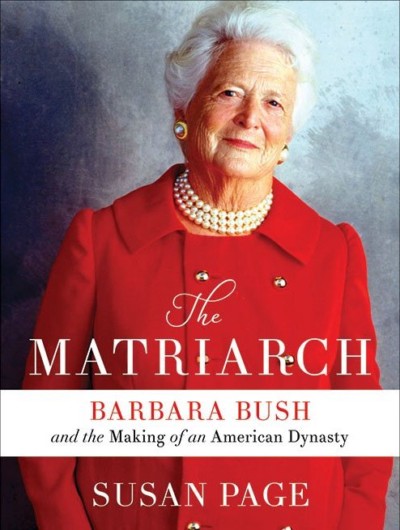“The Matriarch: Barbara Bush
and the Making of an American Dynasty”
by Susan Page

The Matriarch: Barbara Bush and the Making of an American Dynasty
by Susan Page
432 pp., New York: Twelve, 2019
Reviewed by Ed Lengel
Barbara Bush rejected the designation “matriarch.” She and her son, George W. Bush, also scoffed at using “dynasty” to describe their family, “because it’s arrogant, and it’s inherited. You don’t inherit anything like that; it’s earned.”
Nevertheless, Page puts each in the title of her reappraisal of one of the outstanding First Ladies in American history: a woman who was the wife of one president, and the mother of another. She left a defining mark on American political life in two different centuries. Enduringly popular in her lifetime, Barbara Bush is even more so, posthumously, even though the political order she symbolized seems remote.
Born in New York City on June 8, 1925, Barbara Pierce was not quite a “Blue Blood,” but she did boast a lineage that went back to the Mayflower. Her family had undergone its ups and downs since then, but Marvin Pierce, Barbara’s father, was a successful magazine publisher.
She met the love of her life when she was just sixteen years old and got engaged to George H. W. Bush just before he left for service as a U.S. Navy flier in World War II. When he returned to the United States in 1945, they were married, and had their first child, George W. Bush, while the father studied at Yale University. Although George H. W. Bush came from a highly privileged family and sported an Ivy League degree, he was determined to climb the ladder to success from the bottom rung. Barbara followed him unquestioningly as they began their lives in the tiny town of Odessa, Texas, and moved place to place over the years.
Barbara Bush would eventually have six children. One of them, daughter Robin, died of leukemia in 1953 when she was three, but the loss was a defining event in her parents’ lives. Their support for each other through Robin’s illness and death demonstrated the strength of their relationship, which would last 73 years; the painful memories inspired their commitments to community, charity, and public service as the Bush family entered public life.
George H. W. Bush’s decision to pursue politics put a heavy burden on Barbara, who raised her children while supporting her husband’s career. He did not at first consult her on big decisions, assuming, as per the standards of the time, that it was his job to make the choices. In time, though, George discovered that Barbara was not just a source of strength and emotional support, but of wise counsel. As vice president from 1981-1989, and again as president from 1989-1993, he would turn to Barbara for advice several times, and her instincts proved sound. She played a similar role at times during her George W. Bush’s presidency, from 2001-2009.
Bush was also an enduring inspiration in America, with consistently higher ratings in public opinion polls than either her husband or her son.
Susan Page reveals Barbara Bush’s public impact at several points. In the presidential election of 1988, she argues, Barbara pushed her reluctant husband into the aggressive (and negative) style favored by his campaign managers, among them the hyperkinetic Lee Atwater. Arguably, this made the difference in his successful campaign against Democratic challenger Michael Dukakis. As First Lady, Barbara Bush—an avid reader—championed the campaign against adult illiteracy and pushed her husband to support legislation for the cause. She also took a courageously high-profile position in favor of supporting the victims of the HIV/AIDS epidemic that was then approaching its peak. Not only did she encourage her husband to move the government into a more active role in combating the disease than it had done under Ronald Reagan, but she moved her son to prioritize the fight against AIDS in Africa during and after his presidency. At the same time, Barbara Bush engaged in the debate over changing women’s roles in public life, famously giving a commencement address at Wellesley College in which she declared that she was unashamed of choosing to prioritize her life as a wife and mother, while encouraging young women to choose their own way.
Barbara Bush’s unhappy relationship with Nancy Reagan receives substantial attention in Matriarch, as does the pain she endured over her husband’s alleged, but steadfastly denied affair with staffer Jennifer Fitzgerald. Susan Page handles these difficult passages fairly, eliciting multiple points of view from oral interviews with the Bush family, friends, and political associates. Overall, Page’s account relies heavily on these oral interviews–including several she conducted with Barbara and George H. W. Bush shortly before their deaths in 2018. This often gives to Matriarch the air of a collection of reminiscences, rather than a straight biography, as she returns again and again to the atmosphere of the Bushes’ final days. At times, Page’s rather meandering, conversational style, makes it difficult to trace the arc of Barbara Bush’s life. A tighter narrative would have dropped often heavily repetitive text in which statements and scenes appear, repeatedly.
Susan Page’s very human engagement with Barbara Bush and the people with whom she shared her life nevertheless enriches Matriarch with a compassionate understanding of her subject. This is despite—or perhaps even because of—the author’s willingness to contradict Barbara’s Bush’s self-appraisal. Not only did she reject words like “matriarch” and “dynasty,” but she was prone to deprecate her impact on American politics, and on the millions whom she touched. Page rightly demurs, upholding Barbara Bush as an inspiring example—from whom we can still learn, much.
Ed Lengel is the Chief Historian at the National Medal of Honor Museum; Arlington, Texas




